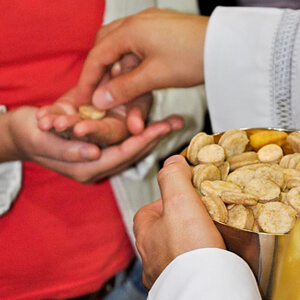
The Church has standard, well established procedures for both minimizing crumbs as well as dealing with any fallen particles of the Eucharist.
As you probably notice, hosts are not like any typical bread. It does not break down or create crumbs easily. Sometimes it does create a bit of particles when the priest needs to fracture the main host, especially when a really big one is used. That’s why we try to do it carefully and also why the purification of the vessels is reserved to the ordained and the acolytes.
Clergy and any extraordinary minister of Communion must be careful that in giving out Communion, should any particles be stuck to their finger, they must never wipe on their clothes or tissue or flick to the floor. They are to wait until after distribution and wash their fingers using the special bowl prepared for that purpose.
For any particles or hosts that are dropped, the standard procedure is:
– as much as possible, either the communicant will pick it up and consume it, or the minister.
– if it is not consumable due to sanitary or other practical reasons, it is to be put in hot water until it dissolves, then the liquid to be poured either into the sacrarium or into the ground, or used for watering plants.


